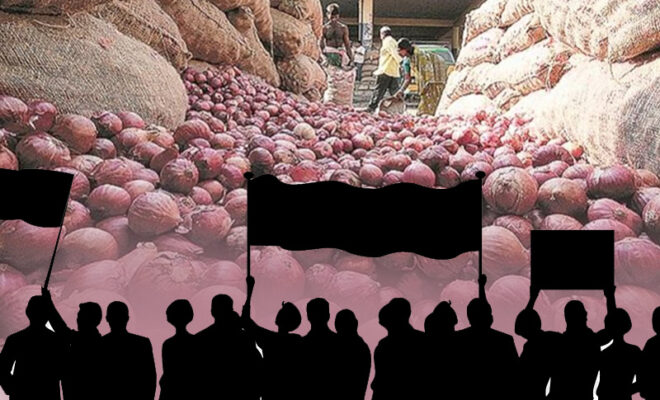Protests Erupt as BJP Ally Joins Maharashtra Farmers Against Onion Export Duty

Farmers in Maharashtra have protested the Indian government’s plan to levy a 40% export duty on onions, which has prompted both the ruling alliances in Delhi and Mumbai to take action to defuse the situation.
In an effort to allay worries and give relief to the farmers who are protesting, the National Cooperative Agricultural Marketing Federation (NAFED) has announced preparations to resume buying onions from farmers. Following the introduction of the export tariff, Deputy Chief Minister Devendra Fadnavis spoke with Union Home Minister Amit Shah and Union Commerce Minister Piyush Goyal to resolve the agitation among farmers.
The government has made the decision to buy two lakh metric tonnes of onions from farmers at a price of Rs 2410 per quintal in order to directly support farmers. To help with this procedure, procurement centers will also be set up in Nashik and Ahmednagar.
There has been strong criticism to the plan to tax onions exported. Traders and commission agents went on an indefinite strike at the Nashik wholesale markets, and several farming organizations protested in the streets. Farmers’ resentment has been made much worse by the timing of the decision, which came as onion prices were beginning to rise after a decline.
A farming organization run by former minister Sadabhau Khot, Rayat Kranti Sanghatana, is one of the groups opposing the decision to impose export duties. Deepak Pagar, the Sanghatana’s head in Nashik, has vowed to lead a tractor rally to Mumbai if the government doesn’t reverse its decision within the next two days.
Nana Patole, the leader of the Congress in Maharashtra, called the decision “anti-farmer” and showed support for the farmers. Sharad Pawar, the head of the NCP, has agreed to back Swabhimani Shetkari Sanghatana, a farmers organization run by former MP Raju Shetti, and will bring up the issue at a future meeting.
Also Read:- Congress Alleges AAP For Helping BJP, Announces PM Candidate
The decision presents substantial difficulties for Maharashtra, which produces up to 40% of the onions consumed in India. After the price of tomatoes increased and concerns about inflation in essential commodities surfaced, the government decided to impose an export duty in order to maintain enough domestic supplies of onions.
The government’s efforts to resolve farmer concerns and stabilize the onion market will be widely watched by the farming community as well as political watchers while protests and negotiations carry on.



